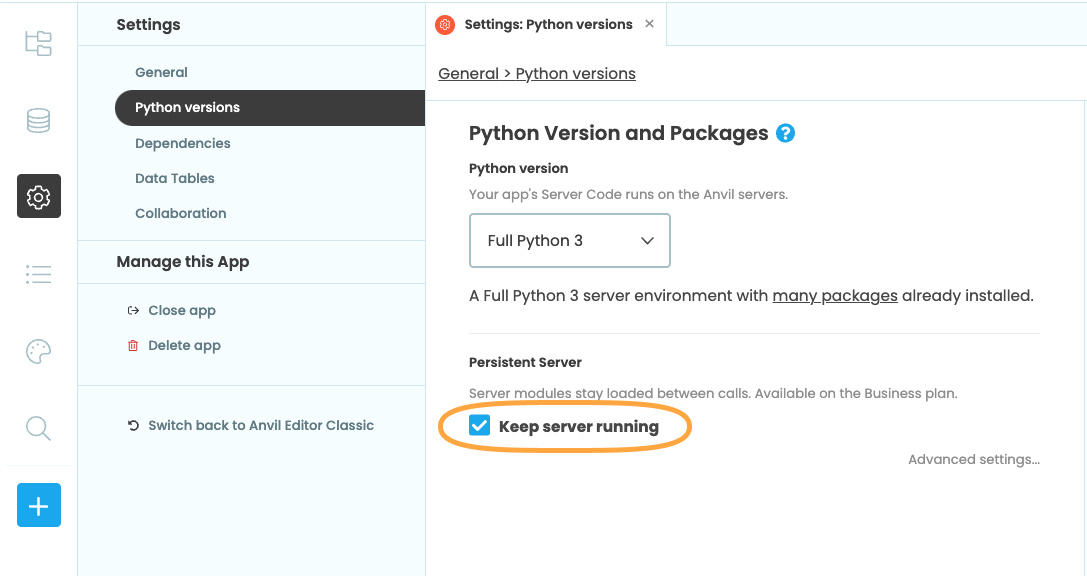Server Modules
Anvil’s Server Modules are a full server-side Python environment, with the ability to import any packages you like.
The user has ultimate control over their own browser: If they open up their browser’s developer tools or Javascript console, they can see and modify all the client-side code in your Anvil app (that’s your Forms and Modules).
Sometimes, you want to write code that always executes exactly as it is written (for example, checking a password before changing a file), or code that contains some secret information (for example, your secret authentication keys for a third-party API).
You can write this code in a server module, and it will never be seen by your app’s users (even if they’re experts and poking around inside their own browser). You can call functions in your server modules from your client side code.
You can pass useful things like data table rows and Media objects to and from server functions, as well as simple Python data structures (more information below).
Check the Quickstart to see some examples and get up and running. To learn more about the difference between client and server code, see this explanation.
Calling server functions from client code
To make a server function available from your client code, decorate it as @anvil.server.callable.
For example, in the Feedback Form tutorial, add_feedback is decorated as @anvil.server.callable:
import anvil.server
@anvil.server.callable
def add_feedback(name, email, feedback):
app_tables.feedback.add_row(
name=name,
email=email,
feedback=feedback,
created=datetime.now()
)
anvil.email.send(to="noreply@anvil.works", # Messages go to the app owner
subject="Feedback from {}".format(name),
text=f"""A new person has filled out the feedback form!
Name: {name}
Email address: {email}
Feedback:{feedback}
""")From ordinary client-side code, you can call your server-side function using anvil.server.call(<function_name>), where function_name is the function name as a string.
For example, the event handler in the Feedback Form app uses anvil.server.call:
def submit_button_click(self, **event_args):
name = self.name_box.text
email = self.email_box.text
feedback = self.feedback_box.text
anvil.server.call('add_feedback', name, email, feedback)
Notification("We have recorded your feedback, and sent an email to the owner of this app.", title="Thanks!").show()
self.clear_inputs()Just call anvil.server.call(name, more_arguments...). Any extra arguments are passed through to the server function. This includes keyword arguments.
You can call server functions from client-side code and Uplink functions (anvil.server.call() is available everywhere).
You can even use it to call server functions from other server functions, though in that case it is more efficient to call the function directly
rather than wrapping it in an anvil.server.call().
Valid arguments and return values
Anvil can only transfer certain data types as the arguments or return values of @anvil.server.callable functions. We call these portable types, and these are:
- Strings
- Numbers
- Lists
- Booleans (
TrueandFalse) - Dicts (with strings as keys)
datetime.dateanddatetime.datetimeobjectsNone- Media objects
- Data Table rows, tables, views or search iterators
- Portable Classes defined by your app
Arguments and return values may not be circular (for example, a dict may not contain itself - directly or indirectly).
Suppressing the spinner
Using anvil.server.call in client code displays a spinner. To call server functions without displaying a spinner, enclose your code in a with anvil.server.no_loading_indicator: block:
def do_guess_silently(n):
with anvil.server.no_loading_indicator:
anvil.server.call("guess", n)You can also call a server function without displaying a spinner by using anvil.server.call_s instead of anvil.server.call:
def do_guess_silently(n):
anvil.server.call_s("guess", n)Customising the name of a server function
You can customise the name of your callable function by passing a parameter to @anvil.server.callable. In
this example, the function foo must be called with anvil.server.call('my_func').
import anvil.server
@anvil.server.callable("my_func")
def foo():
return 42Require user authentication
You can also customise the @anvil.server.callable decorator to verify that a user is logged in using Anvil’s Users Service before executing the function. You do this by passing a require_user parameter to @anvil.server.callable:
# verify that a user is logged in using the Users Service
@anvil.server.callable(require_user=True)require_user can take a boolean value (as above), or a function. If given a function, that function will receive the currently logged-in user (the return value of anvil.users.get_user()).
For example, if your Users table has a boolean column called ‘admin’, you could restrict your server functions to admin users using a regular function:
def validate_user(u):
return u['admin']
@anvil.server.callable(require_user = validate_user)
def test():
print("passed the test!")or a lambda function:
@anvil.server.callable(require_user = lambda u: u['admin'])If the logged in user isn’t an admin, the server will raise a anvil.server.PermissionDenied Exception.
Persistent Server Modules
Each server function call is executed in a new Python interpreter. This means each server call has to wait to execute while the interpreter spins up, and global variables don’t persist between server function calls.
Enabling Persistent Server Modules by checking ‘Keep server running’ allows the same interpreter to be used for multiple server function calls. This speeds up your app when making server calls and improves performance.

Persistent Server Modules can serve as a performance optimisation, allowing you to perform expensive setup when your server code loads for the first time.
Server function timeout
Server functions run synchronously and should return fairly quickly. The timeout is set to 30 seconds, after which a running function will be stopped. For longer-running jobs, you should use Background Tasks.
Do you still have questions?
Our Community Forum is full of helpful information and Anvil experts.

